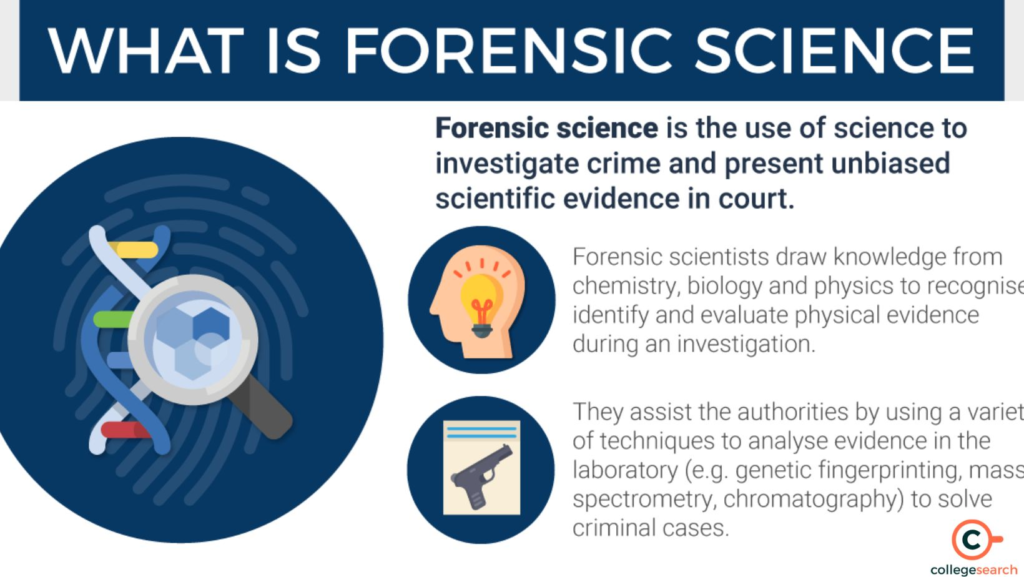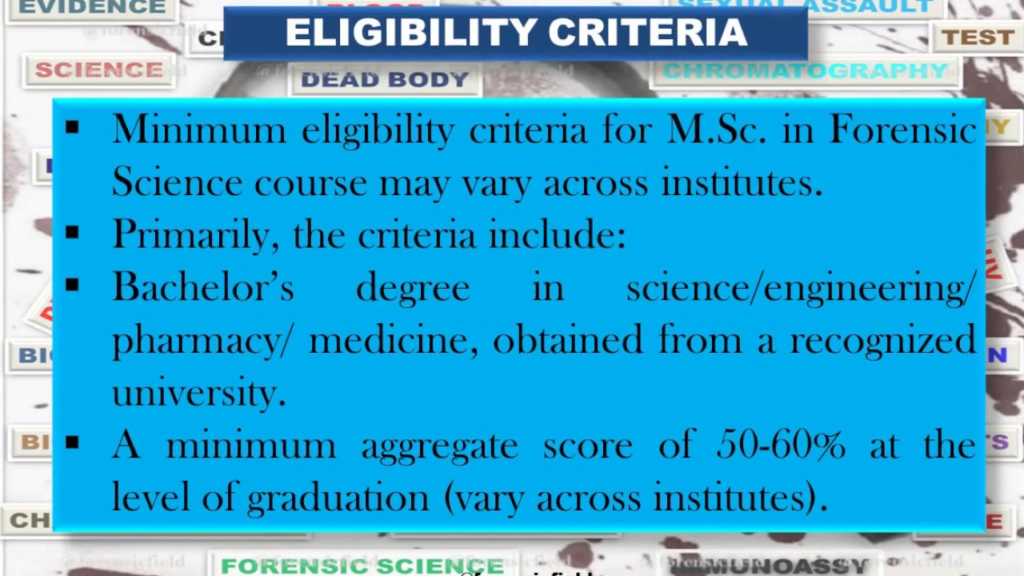What is Forensic Scientist?

A forensic scientist is a highly trained professional who applies scientific methods and techniques to collect, analyze, and interpret evidence related to criminal investigations and legal proceedings. Their role is to provide scientific expertise and objective analysis in order to assist law enforcement agencies, attorneys, and the justice system in understanding the evidence and determining the truth.
Forensic scientists work in various areas of forensic science, such as DNA analysis, toxicology, firearms and ballistics, fingerprint analysis, forensic chemistry, forensic anthropology, digital forensics, and more. They often specialize in a specific discipline and may work in laboratories, crime scene investigation units, or medical examiner’s offices.
The responsibilities of a forensic scientist may include:
- Crime scene investigation: Forensic scientists may be involved in processing crime scenes, collecting and preserving physical evidence, documenting the scene, and ensuring the integrity of the evidence chain of custody.
- Evidence analysis: They conduct detailed examinations and analysis of evidence, such as fingerprints, DNA samples, fibers, firearms, tool marks, bloodstains, drugs, or other substances. They use specialized equipment and techniques to extract information and generate scientific reports.
- Laboratory testing: Forensic scientists often work in laboratories, where they perform tests and experiments on evidence to determine its composition, origin, or other relevant characteristics. They may use chemical, biological, or physical techniques to analyze samples.
- Data interpretation: After analyzing the evidence, forensic scientists interpret the results and provide expert opinions and testimony based on their findings. They may create reports, charts, and other visual aids to present their findings in a clear and understandable manner to investigators, attorneys, and juries.
- Collaboration with other professionals: Forensic scientists work closely with other professionals involved in criminal investigations, such as law enforcement officers, crime scene investigators, forensic pathologists, and legal professionals. They may collaborate in discussing evidence, sharing information, and providing expert advice.
- Continuing education and research: Forensic science is a rapidly evolving field, and forensic scientists are expected to stay updated on the latest scientific advancements, techniques, and legal standards. They may participate in continuing education programs, attend conferences, and engage in research to improve their knowledge and skills.
How to become Forensic Scientist?
Becoming a forensic scientist typically requires a combination of education, training, and experience. Here are the general steps to pursue a career in forensic science:
- Obtain a relevant degree: Start by earning a bachelor’s degree in a scientific field such as forensic science, chemistry, biology, biochemistry, or a related discipline. Some institutions offer specialized forensic science programs, while others offer concentrations or minors in forensic science within broader scientific programs. Ensure that the program you choose covers key forensic science subjects.
- Gain laboratory experience: While pursuing your degree, seek opportunities to gain hands-on laboratory experience. Look for internships, research positions, or volunteer opportunities in forensic science laboratories or related fields. This practical experience will provide valuable skills and insights into the work of a forensic scientist.
- Consider advanced education: Although a bachelor’s degree is the minimum requirement for entry-level positions in forensic science, pursuing advanced education such as a master’s degree or a Ph.D. can enhance your career prospects. Advanced degrees can lead to specialized positions, research opportunities, and higher-level positions in forensic science.
- Choose a specialization: Forensic science covers various disciplines, including DNA analysis, toxicology, firearms examination, digital forensics, and more. Determine your area of interest and consider specializing in that field through coursework, research, and additional training.
- Gain practical experience: After completing your education, seek employment or internships in forensic science laboratories, crime scene investigation units, or other relevant settings. Practical experience is crucial for developing your skills, familiarizing yourself with forensic laboratory procedures, and working with real-world cases.
- Develop relevant skills: Forensic scientists require strong analytical, problem-solving, and critical thinking skills. Additionally, proficiency in using laboratory equipment, understanding scientific protocols, attention to detail, and effective communication skills are vital. Continuously develop and hone these skills throughout your career.
- Stay updated on advancements: Forensic science is a rapidly evolving field with new techniques, technologies, and methodologies emerging regularly. Stay current with advancements by attending professional conferences, workshops, and training programs. Engage in continuing education to expand your knowledge and keep up with industry trends.
- Obtain certifications (optional): While not always mandatory, certifications can demonstrate your expertise and enhance your credibility as a forensic scientist. Various professional organizations offer certifications in specific forensic science disciplines. Examples include the American Board of Criminalistics (ABC), American Board of Forensic Toxicology (ABFT), and International Association for Identification (IAI).
- Seek employment: Look for job opportunities in forensic science laboratories, government agencies, law enforcement agencies, medical examiner’s offices, or private forensic consulting firms. Networking, building connections, and staying informed about job openings in the field can be beneficial during your job search.
- Maintain professionalism and ethics: As a forensic scientist, you’ll be handling sensitive and confidential information. It is crucial to maintain professional ethics, integrity, and objectivity in your work to ensure the accuracy and reliability of your findings.
Forensic Scientist: Eligibility
The eligibility criteria to become a forensic scientist can vary depending on the country, organization, and specific job requirements. However, here are some common eligibility requirements to pursue a career in forensic science:
- Educational qualifications: A minimum requirement for entry-level positions in forensic science is usually a bachelor’s degree in a relevant scientific field such as forensic science, chemistry, biology, biochemistry, or a related discipline. Some positions may require an advanced degree (master’s or Ph.D.) for specialized roles or research positions.
- Specialization and coursework: Depending on the area of forensic science you wish to pursue, it may be beneficial to have completed specialized coursework in that field. For example, if you’re interested in forensic DNA analysis, coursework in genetics, molecular biology, and DNA analysis would be valuable.
- Laboratory experience: Practical experience in a laboratory setting is highly beneficial for aspiring forensic scientists. Look for internships, research positions, or volunteer opportunities in forensic science laboratories or related fields. This hands-on experience helps develop essential laboratory skills and an understanding of forensic protocols and techniques.
- Technical skills: Forensic scientists require strong technical skills, including proficiency in using laboratory equipment, conducting scientific experiments, analyzing data, and interpreting results. Familiarity with scientific software, data analysis techniques, and laboratory protocols is crucial.
- Critical thinking and problem-solving abilities: Forensic scientists need to be analytical, detail-oriented, and possess strong critical thinking skills. They should be able to analyze complex situations, evaluate evidence, and draw logical conclusions based on scientific principles.
- Communication and documentation skills: Effective written and verbal communication skills are essential for forensic scientists. They must be able to document their findings accurately, write scientific reports, and present their findings in a clear and concise manner. They may also need to testify in court as expert witnesses, requiring strong communication skills.
- Ethical conduct: Forensic scientists handle sensitive evidence and information related to criminal investigations. Demonstrating ethical conduct, integrity, and maintaining confidentiality are essential requirements for this profession.

Benefits of Becoming a Forensic Scientist
Becoming a forensic scientist can offer several benefits for individuals interested in this field. Here are some potential advantages of pursuing a career as a forensic scientist:
- Contribution to justice: Forensic scientists play a crucial role in the criminal justice system by providing scientific analysis and evidence interpretation. Their work helps in solving crimes, identifying perpetrators, and bringing justice to victims and their families. Being part of the process to ensure fairness and accuracy in legal proceedings can be highly rewarding.
- Varied and challenging work: Forensic science encompasses various disciplines, including DNA analysis, toxicology, ballistics, fingerprint examination, digital forensics, and more. This diversity allows forensic scientists to engage in a wide range of investigations and challenges, preventing work from becoming monotonous.
- Application of scientific knowledge: Forensic science involves the application of scientific principles and techniques to analyze evidence and solve mysteries. As a forensic scientist, you can utilize your scientific training, skills, and knowledge to make a tangible impact in real-world cases.
- Continuous learning and development: Forensic science is a dynamic field that constantly evolves with new technologies, methodologies, and research. As a forensic scientist, you can engage in continuous learning, keeping up with advancements and expanding your expertise through training programs, conferences, and research opportunities.
- Collaboration and teamwork: Forensic scientists often work in multidisciplinary teams, collaborating with law enforcement personnel, crime scene investigators, attorneys, and other experts. This collaborative environment allows for knowledge sharing, diverse perspectives, and teamwork, fostering professional growth and a sense of camaraderie.
- Job stability and demand: Forensic science is an essential component of the criminal justice system, and there is a consistent demand for qualified forensic scientists. The need for their expertise in crime investigation and analysis ensures job stability and potential career growth opportunities.
- Personal satisfaction: Playing a crucial role in solving crimes and contributing to the justice system can provide a strong sense of personal satisfaction. Knowing that your work helps bring closure to victims, protects the innocent, and upholds the principles of justice can be highly fulfilling.
- Opportunities for specialization: Within forensic science, there are numerous specialization options available. This allows you to focus on a specific area of interest, such as DNA analysis, digital forensics, or forensic toxicology. Specializing can enhance your expertise, open up unique career paths, and potentially lead to advanced research opportunities.
- Professional development and certifications: Forensic science offers opportunities for professional development and certifications. Obtaining relevant certifications from recognized organizations can enhance your credibility, demonstrate your expertise, and open doors to higher-level positions or specialized roles.
- Competitive salary and benefits: Forensic science is a highly specialized field, and professionals with expertise in this area can command competitive salaries and benefits. The precise salary range can vary depending on factors such as experience, specialization, geographic location, and the employing organization.

Jobs and Salary of Forensic Scientist
| Job Title | Salary Range (INR per year) |
| Forensic Scientist | 3,00,000 – 8,00,000+ |
| Crime Scene Examiner | 2,50,000 – 7,00,000+ |
| Forensic Lab Technician | 2,00,000 – 5,00,000+ |
| Forensic Toxicologist | 3,50,000 – 9,00,000+ |
| Forensic DNA Analyst | 4,00,000 – 10,00,000+ |
| Digital Forensic Analyst | 3,50,000 – 8,00,000+ |
| Forensic Ballistics Expert | 3,50,000 – 8,00,000+ |
| Forensic Odontologist | 3,50,000 – 8,00,000+ |
| Forensic Anthropologist | 3,50,000 – 8,00,000+ |

Forensic Scientist: FAQs
Q1: What is the role of a forensic scientist?
A1: Forensic scientists apply scientific principles and techniques to analyze evidence collected from crime scenes. They examine and interpret physical evidence such as DNA, fingerprints, fibers, ballistics, and more. Their role is to provide objective analysis and expert opinions to aid investigations and legal proceedings.
Q2: What are the different specializations within forensic science?
A2: Forensic science encompasses various specializations, including forensic DNA analysis, forensic toxicology, forensic chemistry, forensic anthropology, digital forensics, forensic ballistics, forensic odontology, and more. Each specialization focuses on a specific aspect of forensic analysis and requires specialized knowledge and techniques.
Q3: How long does it take to become a forensic scientist?
A3: The time required to become a forensic scientist can vary depending on the educational path and specialization. Typically, a bachelor’s degree in a relevant field takes around 3-4 years to complete. Further education, such as a master’s or Ph.D., can add an additional 2-6 years. It’s important to note that gaining practical experience and specialized training may also be necessary.
Q4: What education is required to become a forensic scientist?
A4: A minimum requirement for entry-level positions in forensic science is usually a bachelor’s degree in a scientific field such as forensic science, chemistry, biology, or a related discipline. Some positions may require an advanced degree (master’s or Ph.D.) for specialized roles or research positions.
Q5: Do forensic scientists work in laboratories or at crime scenes?
A5: Forensic scientists can work in both laboratory and field settings. In laboratories, they perform detailed analysis and examination of evidence. At crime scenes, they may be involved in processing the scene, collecting evidence, and ensuring proper documentation and preservation of evidence.
Q6: Is there a demand for forensic scientists?
A6: Yes, there is a demand for qualified forensic scientists. Forensic science plays a vital role in criminal investigations and legal proceedings. The demand for forensic scientists exists in government agencies, law enforcement organizations, forensic laboratories, medical examiner’s offices, and private consulting firms.
Q7: Do forensic scientists testify in court?
A7: Yes, forensic scientists may be required to testify in court as expert witnesses. They present their findings, interpretations, and expert opinions based on their scientific analysis. Their testimony helps to explain complex scientific concepts to the court and aid in the understanding of the evidence.
Q8: Are there certification programs for forensic scientists?
A8: Yes, there are certification programs available for forensic scientists. These certifications can demonstrate expertise and credibility in specific areas of forensic science. Examples include certifications in forensic DNA analysis, forensic toxicology, latent print examination, and more. Certifications are often offered by professional organizations or boards in the field.
Q9: What skills are important for a forensic scientist?
A9: Forensic scientists require a combination of scientific, analytical, critical thinking, and communication skills. Proficiency in laboratory techniques, attention to detail, problem-solving abilities, and the ability to work as part of a team are important. Strong written and verbal communication skills are necessary for documenting findings and presenting them clearly.
Q10: Can I specialize in a particular area of forensic science?
A10: Yes, specialization is possible within forensic science. By pursuing additional education, training, and experience in a specific area such as DNA analysis, toxicology, ballistics, or digital forensics, you can develop expertise in that field and pursue specialized roles or research opportunities.
